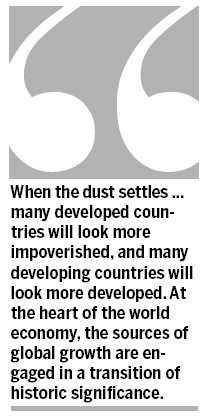Dan Steinbock
Growth shifts to emerging nations
Updated: 2010-04-23 07:44
By Dan Steinbock (China Daily)

Editor's note: World economic center is experiencing a historic transition from the leading advanced nations to the large emerging countries. Protectionism cannot reverse the trend, the author said.
In early April, US Treasury Secretary Timothy Geithner decided to delay the release of the highly anticipated semi-annual currency report to Congress.
The Obama administration opted for a time out, but the Congress did not. Many lawmakers on Capitol Hill will continue to push for revaluation of the renminbi. Yet the concern is misplaced.
Due to the rapid and historical deterioration of public finances in the advanced economies, there is now a shift in the sources of growth from the developed world to the emerging world.
In the early moments of the global financial crisis, the dramatic collapse of world trade was relatively worse than in 1929-30.
|
||||
In the current environment, the protectionist inclinations of the advanced economies are understandable but self-defeating.
In 1930, the Smoot-Hawley Tariff Act raised US tariffs to record levels, which sparked retaliatory tariffs by US trading partners. Instead of promoting employment, these policies contributed to the severity of the Great Depression.
Today, legislators in the advanced economies are flirting with new protectionism. They are playing with fire.
For sustained recovery, the US economy needs to generate some 100,000-120,000 new jobs on a monthly basis. Would appreciation make a difference?
With a substantial currency appreciation, Chinese exports in the US would simply be replaced by those from other low-cost countries, such as Vietnam and India. After all, Washington's trade deficits did not start with China, but with postwar Germany, then with Japan's export-led growth, followed by the East Asian tigers.
A revaluation would not result in new US jobs, but it would increase the inflation rate. Wal-Mart's low prices might no longer be so low. US consumer welfare would suffer from higher prices. The export competitiveness of US multinationals operating in China would deteriorate.
Nor does China account for the entire US deficit. Last year, China's share was less than 38 percent, about the same as the combined share of Mexico, Canada, Japan, Germany and Ireland. Yet, the US trade deficit has not been attributed to the undervaluation of the Mexican peso, the Canadian dollar, the Japanese yen, or the euro.
US has a merchandise trade deficit, but a service trade surplus with China.
Their bilateral economic relations also include foreign direct investment (FDI). US companies have been able to engage in substantial FDI in China, but many Chinese companies have found it difficult to engage in FDI in the US.
Specials

China dream
Popular Bluff, Missouri, native Catherine Beck never imagined her summer experiences in China would change her career course.


